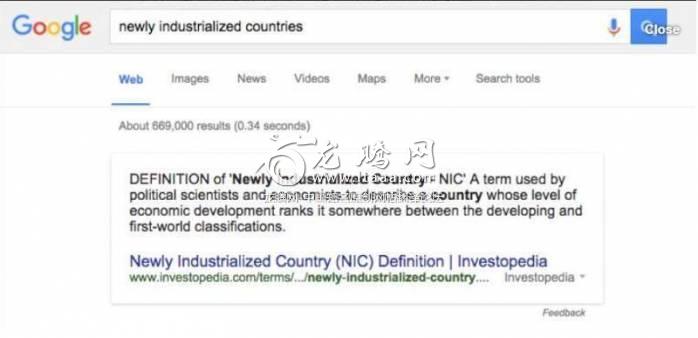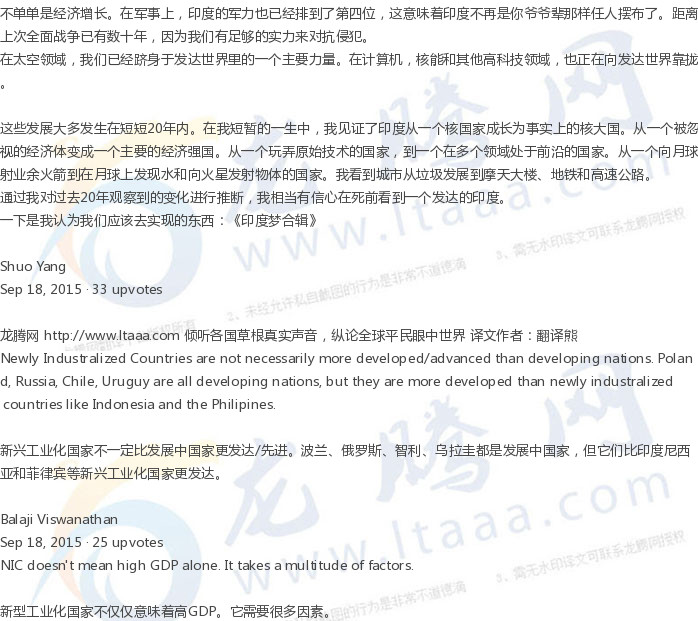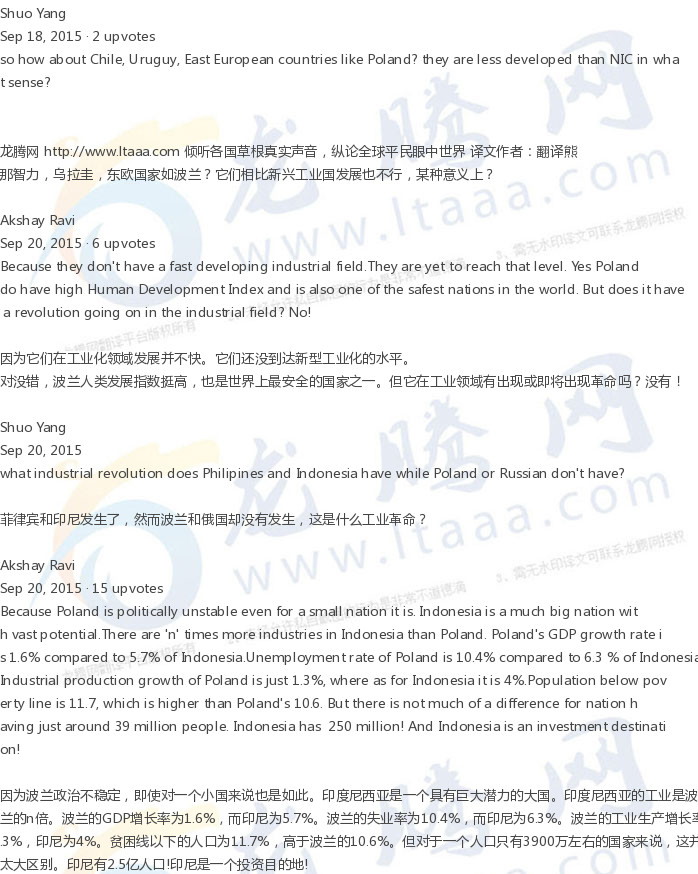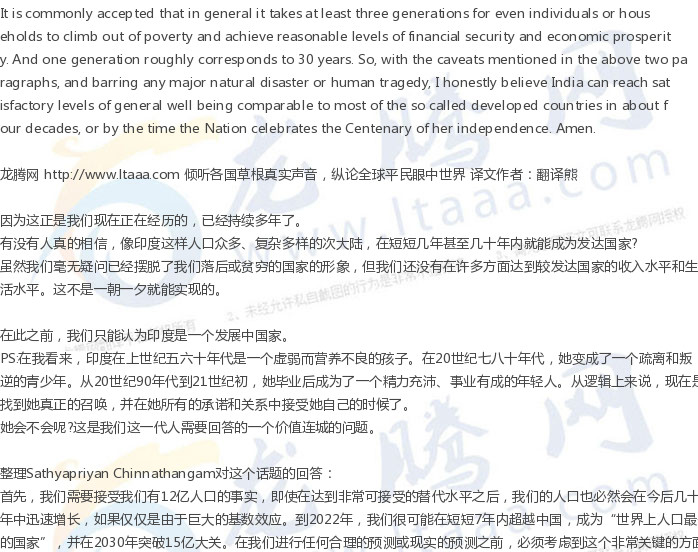为何印度依然是发展中国家?(二) [美国媒体]
quora网友:当我2000年开始上大学时,印度只有一个地铁系统。在15年里,我们在德里、孟买、加尔各答、班加罗尔、钦奈、斋普尔和古尔冈拥有7个地铁系统,另外7个将在两年内开放。曾经有0条高速公路。现在,在接下来的几年里,将会有23和22个新项目.......
Why is India still a developing country?
为何印度依然是发展中国家?
Balaji Viswanathan, Indian by Birth. Indian by Thought.
Answered Sep 18, 2015
Originally Answered: Why do Indians keep on saying that they are a developing nation since they became independent? Are Indians perhaps developing how much time they will take to develop India?
When I started college in 2000, there was just a single metro transit system in India. In 15 years, we now have 7 metro systems in Delhi, Mumbai, Kolkata, Bengaluru, Chennai, Jaipur and Gurgaon and another 7 more to open within 2 years. There were 0 expressways. Now, there are 23 and 22 more to come in the next couple of years. Less than 3 people out of every 100 had a phone and those three were likely urban rich. Now, almost every family has phones.
Not just the technology. 4 more years have been added to an Indian's life with growing life expectancy, while the fertility ratio (# of children per woman) has fallen to a healthy 2.3 from over 3. Only about 40% of females over 15 were literate back in 2000 (Country Profiles). Now, it is over 60%. Enrollment in pre-primary education has more than doubled. There is a massive drop especially in young female illiteracy.
All in a little more than a decade. When someone says India is not developing, they have their eyes tightly shut. We have a long way to go, but we are on track. Why don't poor Indians start a revolution?
As of 2015, India along with Mexico, Brazil, Malaysia, Turkey, South Africa and China has already graduated to the next stage from a developing country. It is no longer considered developing by the IMF, but a Newly industrialized country- just one below the developed. This is a big step since 1947. It is also a part of G-20 major economies - influential economies in the world and becoming a key base for many for world's leading corporations. Even in the 1970s, India found itself ranked only with economic basketcases.
There is not just the economic growth. In military, Indian firepower has already jumped to the 4th place (Global Firepower Military Powers Ranked for 2015) and that means India no longer is pushed around like it was in your grandpa's time. It has been decades since India fought a full war and that is because we have enough firepower to defend against aggression.
In space, we have already become among a major power coming to ranks with the developed world. In computing, nuclear energy and other areas of high technology, it is closing the ranks with the developed world.
A lot of these developments happened in just 20 years. In my own short lifetime, I have seen India grow from a nuclear pariah to a defacto nuclear power. From an ignored economy to a major economic power. From a nation playing with crude technology to a nation on the cutting edge of a number of sectors. From a nation sending amateur rockets to finding water on moon & sending obxts to Mars. I have seen cities grow from rubbish to ones with skyscrapers, metro railsystems and freeways. Different View of India: Pictures of Indian cities you don't see in overseas media.
If I extrapolate the changes I have observed in the last 20 years, I'm fairly confident that I will see a developed India before I die.
Here is what I think we should do to get there: India Dreams Collection
当我2000年开始上大学时,印度只有一个地铁系统。在15年里,我们在德里、孟买、加尔各答、班加罗尔、钦奈、斋普尔和古尔冈拥有7个地铁系统,另外7个将在两年内开放。曾经有0条高速公路。现在,在接下来的几年里,将会有23和22个新项目。曾经每100人中只有不到3人拥有手机,而这3人很可能是城市富人。现在,几乎每个家庭都有手机。
不仅仅是技术。随着预期寿命的增长,印度人的寿命又增加了4年,而生育率(每个妇女生育孩子的数量)从3岁以上降到了健康的2.3岁。在2000年,15岁以上的女性中只有40%的人识字。现在学前教育的注册人数增加了一倍多超过了60%。特别是年轻女性的文盲率大幅下降。
这一切都发生在十多年前。当有人说印度没有发展时,他们会闭上眼睛。我们还有很长的路要走,但我们正步入正轨。
截至2015年,印度、墨西哥、巴西、马来西亚、土耳其、南非和中国已经从一个发展中国家进入下一个阶段。它不再被国际货币基金组织视为发展中国家,而是一个新兴的工业化国家——仅仅比发达国家低一点。
这是自1947年以来的巨大飞跃(注:印度1947年独立。)它也是20国集团(G20)主要经济体的一部分。20国集团是世界上有影响力的经济体,成为许多世界主要企业的关键基地。即便是在上世纪70年代,印度也发现自己的经济表现平平。
Shuo Yang
Sep 18, 2015 · 5 upvotes
but it does not mean that NIC is more advanced than developing nations. "NIC is diffrerent from developing nations " is like "new student is different from old student"。NIC is not the next stage of developing nations
Rissia was NIC before but now a developing nation
但这也同样不意味着新兴工业国家比发展中国家更先进。“新兴工业国不同于发展中国家”就像“新来的学生跟老油条不同一样”,新兴工业国不是发展中国家的下一个阶段
俄国以前也是新兴工业国,现在是发展中国家。
Balaji Viswanathan
Sep 18, 2015 · 6 upvotes
Follow the nic definition in the wiki lix above.
关于新兴工业国的定义,参照维基百科。
Shuo Yang
Sep 18, 2015 · 4 upvotes
wiki does not mean NIC is more advanced than developing nations. Russia is a developing nation,but it has industralized. NIC only means the country is developing or industralizing fast now
维基并没有说新兴工业国比发展中国家更先进。俄国当前就是发展中国家,但它已实现工业化了。新兴工业国意味着这个国家正在发展中或者工业化很快而已。
Balaji Viswanathan
(注:翻译过来就是,新型工业化国家的定义是:这是一个政治学者和经济学家用来描述,一个国家的发展水平介于发展中国家和第一世界之间的术语。)
Shuo Yang
Sep 18, 2015 · 4 upvotes
Indonesia and Philipines are NIC,so they are more developed or advanced than Russia ?
印度尼西亚和菲律宾也是新型工业化国家,所以它们比俄国更先进罗?
Balaji Viswanathan
Sep 18, 2015 · 17 upvotes
In some sense yes. NIC includes how open the economy is, the pace of growth, entry of capital, safety to do business, stability of politics, building of new urban centers and so on. Russia fails most of these factors.
某种意义上来说是的。新兴工业化国家事关经济开放度,增长速度,外资投资,政治稳定,新城市中心的建立等等。俄国在大多数这些因素上都失败了。
Aravind Aldk, former Consultant at Caterpillar
Answered Aug 5, 2014
Originally Answered: What are the reasons due to which India is still a 3rd world country?
The term Third World arose during the Cold War to define countries that remained non-aligned with either NATO (with the United States) or the Communist Bloc (with the Soviet unx.
This terminology provided a way of broadly categorizing the nations of the Earth into three groups based on social, political, cultural and economic divisions.
The Third World was normally seen to include many countries with colonial pasts in Africa, Latin America, Oceania and Asia. It was also sometimes taken as synonymous with countries in the Non-Aligned Movement. Many Third World countries were extremely poor, and non-industrialized, it became a stereotype to refer to poor countries as "third world countries",
Yet the "Third World" term is also often taken to include newly industrialized countries like India, Brazil or China. Historically,
some European countries were part of the non-aligned movement and a few were and are very prosperous, including Switzerland, Republic of Ireland and Austria.
India will always be a 3rd World Country , They have close ties with Russia and ok ties with US. They doesn't want to join on either side.
“第三世界”(Third World)一词是在冷战期间出现的,用来定义那些与北约(NATO)(与美国)或共产主义阵营(与苏联)保持不结盟的国家。
这个术语提供了一种根据社会、政治、文化和经济分歧将地球上的国家大致分为三类的方法。
第三世界通常被认为包括非洲、拉丁美洲、大洋洲和亚洲许多有殖民历史的国家。它有时也被认为是不结盟运动国家的同义词。
许多第三世界国家非常贫穷,而且没有工业化,把贫穷国家称为“第三世界国家”成为一种刻板印象。
然而,“第三世界”一词也经常被认为包括像印度、巴西或中国这样的新工业化国家。从历史上看,一些欧洲国家是不结盟运动的一部分,其中一些是非常繁荣的,包括瑞士、爱尔兰共和国和奥地利。印度将永远是第三世界国家,与俄罗斯有着密切的关系,与我们有良好的关系。他们不想加入任何一方。
Nagarajan Srinivas, No less proud or less patriotic than any other Indian ;)
upxed Oct 6, 2015
Originally Answered: Politics of India: Why do people still think and say India is a developing country from years?
Because that is exactly what we are now, developing, for years.
Does anybody realistically believe that a vast sub continent like India with a huge and diverse population and a host of contentious and complex issues can become a developed country within just a few years, or even decades?
Though we have without doubt shaken off our image as a backward or poor country, we are yet to cover a lot of ground to reach the income levels and standards of living of the more developed countries.This can not be achieved overnight, or even anytime very soon.
Till such time we can only think and say that India is a developing country.
PS: In my perception India was a weak and malnourished child during the 1950s and 60s. She became an alienated and rebellious adolescent teen through the 1970s and 80s.She graduated to be a strapping youth of energy and enterprise around the 1990s through the 2000s. Logically now is the time and age for her to find her true calling and come to terms with herself in all her commitments and relationships.
Will she or won't she? That is the million dollar question for the present generation to answer ;)
EDIT in response to the excellent comment of Sathyapriyan Chinnathangam
First and foremost we need to accept that we have a population of 1.2 billion people, and even after achieving eminently acceptable replacement levels, our population is bound to grow rapidly for some more decades if only due to the huge base effect. We are likely to overtake China as the"world's most populous nation" in just 7 years time by 2022, and cross the 1.50 billion mark by 2030. This very crucial aspect has to be factored in before we embark on any reasonable predictions or realistic projections.
I think housing for all is a very tall order, and most probably not feasible even in most of the developed countries. Other than this, access to all other amenities mentioned in the comment are already improving consistently through the earlier, more difficult decades, and are likely to grow exponentially in the coming decades, due to the effects of exposure to globalization, and rapidly expanding technology. Even here, all that any Government can aim is to absolutely reduce the levels of absolute poverty, and relatively reduce the relative poverty, because total eradication of poverty is well nigh impossible at any point of time in any large societies.
我认为为所有人提供住房是一项非常艰巨的任务,即使在大多数发达国家也很可能不可行。除此之外,评论中提到的所有其他便利设施的使用在过去的几十年里都在持续改善,在未来的几十年里,由于全球化的影响和快速发展的技术,这些设施可能会呈指数级增长。即使在这里,任何政府的目标都是减少绝对贫困,相对减少相对贫困,因为完全消除贫困是可行的
人们普遍认为,一般来说,即使是个人或家庭,至少需要三代人才能摆脱贫困,实现合理的金融安全和经济繁荣。一代人大约相当于30年。所以,只要没有任何重大自然灾害或人为悲剧,我真的相信在大约四十年里印度可以达到令人满意的水平,与大多数所谓的发达国家相当,。阿们。
注:“我必须学习政治和战争,这样,我的孩子们也许就有了学习数学,哲学,自然历史的自由,学习绘画,诗歌,音乐,建筑,绣帷,陶瓷的权利了。”——John Adams
Anshit Srivastava
Answered Apr 1
Have a look at this conversation and you will get your answer in 2 minutes.
Place: MUN New York (An event where students from the all over the world and discuss about some important global topics)
[Event has juts finished. Rishi from India is having some casual talks with Jason of the United States of America]
Jason: India is such a good country in terms of education. But why is India still a developing country?
Rishi: What do you mean dude? We have hundreds of monuments all over the country which clearly shows the creative mind of Indian architects!
Jason: You are going too behind dude. I didn’t meant to say that. According to the current stats, India is on the verge of becoming the country with most unemployed citizens. Don’t you think it is a matter of concern?
Rishi: How do you say that? Sundar Pichai from our country is CEO of one of the biggest firms of the world.
Jason: You are talking about one person brother. Leave that. I’ve heard that you guys consider one candidate with comparatively lower marks superior to the other candidate with higher marks. What about that?
Rishi: That’s rubbish. We do that because the guy with the comparatively lower marks belong to a backward category and the guy with higher marks is from a normal category. This rule was implemented for the upliftment of poor belonging to backward categories 60 years ago
Jason: That’s stupid. So nothing has changed since 60 years. You still think that guy from the so called backward category is still poor. World has witnessed insane changes in the 60 years, how that guy is still feeling himself inferior to others?
Rishi: He deserves to get the reservation because his father-grandfathers were oppressed by the high category folks long time ago. They have achieved a good lifestyle after lot of difficulties.
Jason: So what? Are they still poor? Aren’t they equal now? What about those guys from the normal category? Do they all have a lavish lifestyle?
Rishi: Try to understand my point brother. They belong to the backward caste and they need to be uplifted, no matter if they are rich, just because their parents were treated poorly, he would get that privilidge throughout their life. People from General category are not always rich at all, but they must work hard because they were not oppressed by high categories long time ago.
[Jason was frustrated, he still had a lot of questions about the rubbish his friend Rishi from India was talking. But he got the answer he wanted to get.]
Jason: It was nice meeting you Rishi. I’ve got my answer. Thank You.
[Jason gets up and go away]
里希:试着理解我的观点。他们属于落后的种姓,他们需要被提升,无论他们是否富有,仅仅因为他们的父母受到恶劣的对待,他就会在他们的一生中得到这种特权。一般类别的人并不总是富有的,但他们必须努力工作,因为他们很久以前就没有受到高级类别的压迫。
(贾森很点沮丧,他仍然对这位来自印度的朋友正在谈论的“不值一驳的话题”充满疑问。但他得到了他想要的答案。)
令人沮丧的是,即使在独立70年后,我们仍然相信以种姓预留制。如果控制权力的人的潜力不如过平庸生活的人那么大,那么印度怎么可能在10年内成为超级大国呢?就因为前者属于保留范畴,后者属于一般范畴。
Bhoomi, keeping a keen sight on happenings
upxed Feb 21
I remember Swami Vivekananda once said, "Give me 100 energetic youth, I shall transform India."
A magnanimous personality like him doesn't come on this earth time and again. He, being such a prolific identity, found it hard to gather up 100 such individuals who were committed to change India. This was a case in the 80s. We are here in the 21st century and today we can find not 100 or 1000 such individuals, but millions of them. They are determined to remove the odds that persist in India. But today this is not enough.
The good part is, the change has begun.
The biggest bane in India is of increasing population. While India has stayed successful in controlling death rate, the same cannot be said for the birth rate. This is because people think the birth of a child rests in the hands of God. If death can be controlled and managed by humans themselves (with so many medical inventions coming up), why can't birth be?
This will happen when there will be a change in people from within their mindset. India's development has always rested in the hands of billion people who reside in here. Once we get this clear that India begins with us and ends with us, it won't take long for us to see India as one among the developed nations.
(my views and opinions are inspired from the Mystic and are purely personal).
我记得斯瓦米·维韦卡南达(Swami Vivekananda)曾经说过:“给我100个充满活力的年轻人,我会改变印度。”
像他这样心地高尚的人不会在这个世界上出现一次又一次。作为一个多产的身份,他发现很难收集到100个致力于改变印度的人。这是80年代的一个例子。
我们生活在21世纪,今天我们能找到的不是100或1000个这样的人,而是数以百万计的人。他们决心消除印度存在的问题。但今天这还不够。好在,变化已经在进行中。
印度最大的障碍是不断增长的人口。然而印度依然成功控制了死亡率,出生率则相反。这是因为人们觉得孩子的出生掌握在上帝手中。
但如果死亡能被人类自己所控制和管理的话,那么出生率为何不行?
人们的心态发生改变时,这种情况就会发生。印度的发展一直掌握在十亿人口手中。一旦我们清楚地认识到,印度从我们开始,到我们结束,我们很快就会把印度视为发达国家之一。
版权声明
我们致力于传递世界各地老百姓最真实、最直接、最详尽的对中国的看法
【版权与免责声明】如发现内容存在版权问题,烦请提供相关信息发邮件,
我们将及时沟通与处理。本站内容除非来源注明五毛网,否则均为网友转载,涉及言论、版权与本站无关。
本文仅代表作者观点,不代表本站立场。
本文来自网络,如有侵权及时联系本网站。
图文文章RECOMMEND
热门文章HOT NEWS
-
1
Why do most people who have a positive view of China have been to ...
- 2
- 3
- 4
- 5
- 6
- 7
- 8
- 9
- 10
推荐文章HOT NEWS
-
1
Why do most people who have a positive view of China have been to ...
- 2
- 3
- 4
- 5
- 6
- 7
- 8
- 9
- 10














